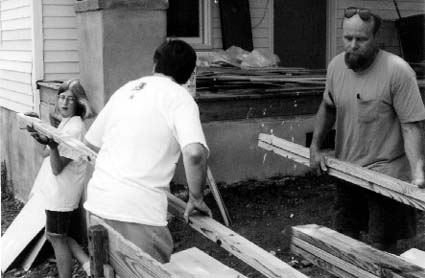In the weeks after September 11, there was much talk of a revival of popular respect for government, of a renewed sense of public purpose. Part of what brought us together in those dark hours was fear and anger, but something deeper was also at work. For one thing, there were the firefighters. For a while at least, emergency response teams risking their lives to rescue people replaced Motor Vehicle bureaucrats as the icon of the public employee in the mind of the public that employed them.
At the same time, the terrorist attacks forced a complacent country to reconsider its priorities, to focus its collective attention on addressing real needs. Granted, the most immediate concerns involved national security and public safety, but even our understanding of those needs broadened: Whatever you thought about nuclear missile defense, it wasn’t going to intercept anthrax-laced letters.
In the right hands, the rediscovery that government has an important role to play in our lives could have been a golden opportunity to reframe the debate over social policy. An inspired leader could have inspired the nation with a call to extend our international resolve to domestic concerns and challenged us to address unmet needs at home in housing, and health care, and economic security.
In this issue, Sheila Crowley argues that affordable housing needs a champion. I’d take that a step further: People paying more rent than they can manage or living in substandard housing, people without health insurance, people who lack jobs, children growing up in poverty, all need a champion who will challenge the nation to join in a crusade against economic want and injustice.
Some would argue that our political system does not produce champions. I would beg to differ: The affluent have a champion in George W. Bush, who pledged recently that their tax cuts would be rolled back “over my dead body,” the nation’s other needs and even its fiscal health notwithstanding. Would that there were a similarly strong voice on the other side. When Senate Majority Leader Tom Daschle blamed the Bush cuts for using up the federal surplus and hampering the economic recovery, some of his fellow Democrats complained that he was hurting the party. And Daschle hadn’t even called for a rollback of the tax cuts.
One institutional constraint on the willingness of even progressive legislators to take up the cause of the downtrodden is our corrupting system of campaign finance. Even liberal Democrats find themselves torn between the issues they care about and the sources of money that can keep them in office. My favorite fact about Enron is that, of the 248 legislators on congressional committees investigating various aspects of the Enron scandal, fully 212 received campaign dollars from executives of Enron or its hear-no-evil auditors, Arthur Andersen. That’s why Enron had champions, lots of them. Where are ours?
The last national candidate who took on anything like that role was former senator Bill Bradley, who built his 2000 presidential bid around a pledge to extend health insurance to every child in America. His (Democratic) opponent warned that the price was too high and, even more preposterously, that the proposal might hurt the poor. Sadly, many supposedly progressive interests joined the chorus of criticism, apparently having decided in their infinite wisdom that they were going to back a winner.
Bradley was hardly an ideal torch-bearer for activist, progressive government. But his experience will make it even harder for candidates with national aspirations to take up the mantle. (One can hear the political consultants warning their clients away from such radical ideas: “Look what happened to Bradley!”)
So what to do while we wait for a champion to emerge? We do what a lot of Shelterforce readers are already doing – build housing, empower communities, find hope in local action. One of the most appealing attributes of the community building field is that it finds ways to get things done even in the most politically hostile environments.
But we also need to be realistic about just how much we can accomplish in such an environment. This is an election year, and while the numbers offer very little hope for unseating the conservative majority in Congress, it’s a chance for communities to engage candidates in a conversation about the need for positive government. After all, community building is sure to be easier when there’s someone out there saying, “Americans will sleep on grates over my dead body!”




Comments